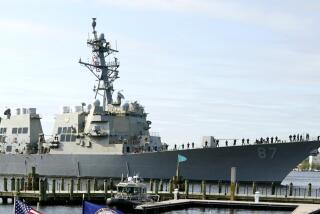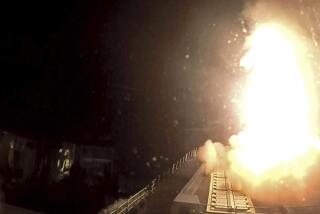Japanese Firms So Far Escape War’s Effects : Commerce: If the conflict drags on, trade probably will suffer. The major short-term impact has been rising costs--such as shipping expenses.
TOKYO — The Persian Gulf War is likely to sharply curtail Japan’s trade with Persian Gulf nations and has already resulted in the temporary suspension of some projects.
But businesses here say they will not be seriously hurt unless the war continues for several months or unless Israel joins the war, resulting in a blocked Suez Canal. Japan has been stockpiling oil in anticipation of hostilities. And even a long Gulf War is not expected to seriously harm the nation’s economy.
Clearly, however, the war is beginning to raise Japan’s costs of trading with the Middle East.
Insurance companies have nearly doubled the price of insuring ships traveling to the war-torn region, substantially raising shipping costs. Meanwhile, Japan’s Ministry of International Trade and Industry has told Japanese companies that it will temporarily suspend government-sponsored insurance on gulf-related trade.
Japanese shipping firms have also agreed with their unions not to send Japanese-chartered vessels and Japanese seamen to the gulf, according to newspaper reports. The last eight Japanese ships in the gulf left the region Friday.
It is still far too early to tell what eventual impact these measures will have on Japan’s trade with the Middle East.
Toyota, which exported 150,000 cars to the Middle East last year, said it plans to continue shipping.
Toyota and most other Japanese corporations have set up crisis centers to monitor developments in the Mideast. Many, including NEC Corp., have temporarily barred employees from international travel for fear of terrorist attacks.
The main concern of Japan and other Asian countries, including Taiwan and Korea, is the impact of the war on oil supplies. All three nations are dependent on the Mideast for more than 70% of their oil.
But most have built up reserves in the six months since Iraq invaded Kuwait. Taiwan has raised its reserves to 140 days, from 90 days before the onset of the crisis. Taiwan’s Ministry of Economic Affairs has also announced an emergency energy-savings plan to go into effect if the war disturbs oil imports. The plan includes the shortening of television broadcast hours and earlier closings for “entertainment industries.”
Japan has a 142-day supply of oil reserves, as companies loaded up in anticipation of an outbreak of war. Seventy tankers were steaming out of the region carrying 19 million barrels of oil as the Jan. 15 deadline passed for Iraq to leave Kuwait.
Although Japanese companies say they have plenty of oil to last through the end of February, MITI has announced that it will begin releasing oil from its reserves as a means of stabilizing prices.
Prices at the gas stand could go up, however. MITI is considering an increase in oil-related taxes as one way of paying for financial assistance for U.S.-led forces in the gulf.
Japan’s only casualty in the war is the result of a missile that struck a storage tank at Arabian Oil, a petrochemical operation partially owned by Japanese interests in Saudi Arabia near the Kuwaiti border. Operations at the site have been temporarily suspended, and Japan is considering whether to reopen it.
Japanese corporations are well-prepared to make such decisions. Most have special headquarters staffed with Mideast specialists who are fed the latest news on developments in the region.
Mitsubishi Corp., which has broad interests in the Middle East, in August established a gulf crisis center in Tokyo staffed with more than 20 employees. The center is charged with collecting information from the trading company’s 150 offices worldwide, government sources and the media. The center also acts as a liaison with government officials, corporate customers and families of employees in the region.
In Saudi Arabia, for example, the company is in a joint venture to build a power station. It decided to temporarily stop construction the day after the war broke out.
On the other hand, a separate petrochemical venture in Saudi Arabia continues to operate. “One missile has reached the area, but it is not serious. If there are three missiles, we might shut down,” said Seiichi Narita, a Mitsubishi Corp. official.
The company also must take into account the question of “face” for Saudi Arabia, Narita said. The Saudis “believe there is peace (in their nation) and they are being defended. They don’t want to shut down.” With other U.S.-related joint ventures in the area continuing to operate, “Japan alone can’t shut down,” Narita said.
One prescient move by the company was to bring back all its employees and their families from the gulf in August. Since then, employees have traveled to and from the area on business trips.
Employees working out of suitcases are more ready to move about as ordered by the company, Narita said. When employees are based at one site, they often have a strong sense of responsibility toward their projects and customers and insist on staying.
“Just like the captain sinks with his ship, sometimes the employee will refuse to leave, even when it gets dangerous,” Narita said.
Indeed, although Japan won’t send soldiers to fight in the war, the Japanese press is carrying stories of stubborn employees in hazardous areas who insist on pushing forward on projects despite company orders that they return to Japan or move to a safer city. Japanese companies have about 200 employees still in the Persian Gulf.
Although many are anxious about the impacts of a longer war, economists say that even the worst-case scenario doesn’t look bad for the Japanese economy.
Tokai Bank estimates that a one-month war would have a negligible impact on the economy. Even if the war lasted a year, the bank estimates, it would reduce Japan’s real gross national product by only about 1 percentage point, bringing growth to about 2% for 1991.
A war of that duration, however, would reduce the U.S. gross national product by 1.5 percentage points in 1991--a far more serious scenario because the United States is already in a recession.
More to Read
Inside the business of entertainment
The Wide Shot brings you news, analysis and insights on everything from streaming wars to production — and what it all means for the future.
You may occasionally receive promotional content from the Los Angeles Times.










